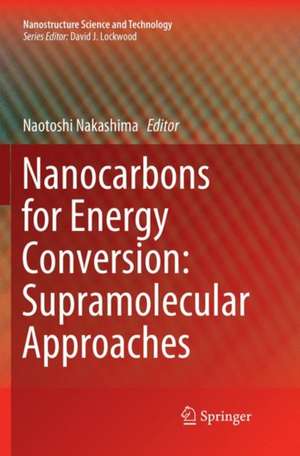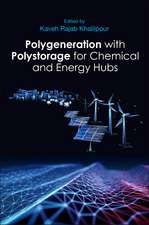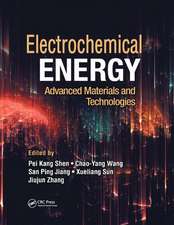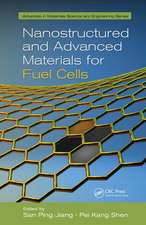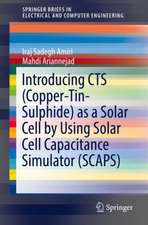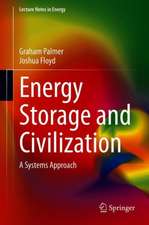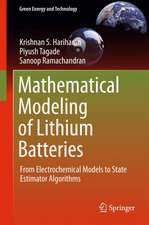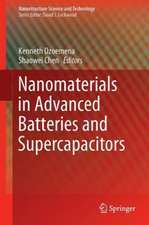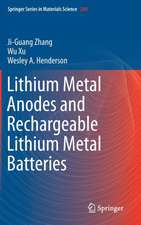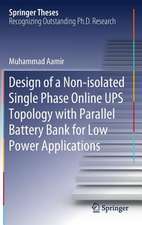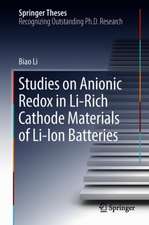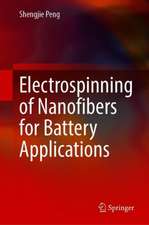Nanocarbons for Energy Conversion: Supramolecular Approaches: Nanostructure Science and Technology
Editat de Naotoshi Nakashimaen Limba Engleză Paperback – 20 dec 2018
| Toate formatele și edițiile | Preț | Express |
|---|---|---|
| Paperback (1) | 1012.08 lei 6-8 săpt. | |
| Springer International Publishing – 20 dec 2018 | 1012.08 lei 6-8 săpt. | |
| Hardback (1) | 1018.37 lei 6-8 săpt. | |
| Springer International Publishing – 23 aug 2018 | 1018.37 lei 6-8 săpt. |
Din seria Nanostructure Science and Technology
- 18%
 Preț: 1114.65 lei
Preț: 1114.65 lei - 18%
 Preț: 1001.02 lei
Preț: 1001.02 lei - 24%
 Preț: 834.59 lei
Preț: 834.59 lei -
 Preț: 405.66 lei
Preț: 405.66 lei -
 Preț: 405.28 lei
Preț: 405.28 lei - 18%
 Preț: 947.35 lei
Preț: 947.35 lei - 18%
 Preț: 734.27 lei
Preț: 734.27 lei - 15%
 Preț: 696.02 lei
Preț: 696.02 lei - 20%
 Preț: 585.30 lei
Preț: 585.30 lei - 20%
 Preț: 556.90 lei
Preț: 556.90 lei - 15%
 Preț: 646.62 lei
Preț: 646.62 lei - 18%
 Preț: 947.50 lei
Preț: 947.50 lei -
 Preț: 397.97 lei
Preț: 397.97 lei -
 Preț: 406.05 lei
Preț: 406.05 lei - 18%
 Preț: 967.08 lei
Preț: 967.08 lei - 18%
 Preț: 947.50 lei
Preț: 947.50 lei - 18%
 Preț: 948.29 lei
Preț: 948.29 lei - 18%
 Preț: 950.03 lei
Preț: 950.03 lei - 18%
 Preț: 951.29 lei
Preț: 951.29 lei - 18%
 Preț: 948.92 lei
Preț: 948.92 lei - 18%
 Preț: 960.13 lei
Preț: 960.13 lei - 19%
 Preț: 559.02 lei
Preț: 559.02 lei - 15%
 Preț: 694.69 lei
Preț: 694.69 lei - 15%
 Preț: 635.15 lei
Preț: 635.15 lei - 15%
 Preț: 640.06 lei
Preț: 640.06 lei - 18%
 Preț: 948.79 lei
Preț: 948.79 lei - 20%
 Preț: 564.28 lei
Preț: 564.28 lei - 20%
 Preț: 628.34 lei
Preț: 628.34 lei - 15%
 Preț: 647.59 lei
Preț: 647.59 lei - 15%
 Preț: 643.16 lei
Preț: 643.16 lei - 15%
 Preț: 643.34 lei
Preț: 643.34 lei - 18%
 Preț: 955.08 lei
Preț: 955.08 lei - 15%
 Preț: 587.72 lei
Preț: 587.72 lei - 15%
 Preț: 649.87 lei
Preț: 649.87 lei - 15%
 Preț: 646.43 lei
Preț: 646.43 lei -
 Preț: 388.72 lei
Preț: 388.72 lei - 18%
 Preț: 955.25 lei
Preț: 955.25 lei - 5%
 Preț: 716.76 lei
Preț: 716.76 lei - 18%
 Preț: 952.89 lei
Preț: 952.89 lei - 18%
 Preț: 1258.46 lei
Preț: 1258.46 lei
Preț: 1012.08 lei
Preț vechi: 1234.24 lei
-18% Nou
Puncte Express: 1518
Preț estimativ în valută:
193.68€ • 210.31$ • 162.69£
193.68€ • 210.31$ • 162.69£
Carte tipărită la comandă
Livrare economică 22 aprilie-06 mai
Preluare comenzi: 021 569.72.76
Specificații
ISBN-13: 9783030065461
ISBN-10: 3030065464
Pagini: 564
Ilustrații: VIII, 564 p. 352 illus., 234 illus. in color.
Dimensiuni: 155 x 235 mm
Greutate: 0.79 kg
Ediția:Softcover reprint of the original 1st ed. 2019
Editura: Springer International Publishing
Colecția Springer
Seria Nanostructure Science and Technology
Locul publicării:Cham, Switzerland
ISBN-10: 3030065464
Pagini: 564
Ilustrații: VIII, 564 p. 352 illus., 234 illus. in color.
Dimensiuni: 155 x 235 mm
Greutate: 0.79 kg
Ediția:Softcover reprint of the original 1st ed. 2019
Editura: Springer International Publishing
Colecția Springer
Seria Nanostructure Science and Technology
Locul publicării:Cham, Switzerland
Cuprins
Carbon Nanotube-based Fuel Cell Catalysts-Comparison with Carbon Black.- Carbon Nanotube-based Direct Methanol Fuel Cell Catalysts.- Recent Progress in Carbon Black-based Polymer Electrolyte Fuel Cell.- Nanostructures and Stability of polymer electrolyte fuel cell catalysts based on in situ TEM.- Synthesis of Nanoporous Carbon and their application to fuel cell and capacitor.- Theoretical approach for nanocarbon-based energy catalysts design.- Graphene foam-based fuel cell catalysts.- Carbon nanotube-based photocatalyst for hydrogen production.- Energy Conversion Catalyst Design.- Recent Progress in Non-Precious Metal Fuel Cell Catalysts.- Kinetics of Oxidation Reduction Reaction for Non-Precious Metal Fuel Cell.- Carbon nanotube-based Non-Pt Fuel Cell Catalysts.- Polymer Electrolyte Membranes Design for Fuel Cells in Acidic Media.- Polymer Electrolyte Membranes Design for Alkaline Fuel Cells.- Carbon nanotube-based bio-fuel cells.- Improved Synthesis of Graphene Oxides and Their Application.- Glycolic acid as an efficient energy carrier.- Recent progress in nanocarbon-based Li ion battery.- Nanocarbon-based electrode catalyst design for battery and water splitting.- Carbon nanotube-based solar cells.- Carbon nanotube-based up-conversion for new energy material design.- Carbon nanotube-based thermoelectric devices.
Recenzii
“The reviewer would recommend this book for any researchers working with carbon nanomaterials, particularly nanotubes, as well as researchers working with PEMFCs. Overall, an interesting read that reminds the reader of the impressive versatility and seemingly endless applications of carbon nanomaterials.” (Harry Macpherson, Johnson Matthey Technology Review, Vol. 63 (4), 2019)
Notă biografică
Natoshi Nakashima is currently a professor at Kyushu University in Japan.
Textul de pe ultima copertă
This book focuses on nanocarbons (carbon nanotubes, graphene, nanoporous carbon, and carbon black) and related materials for energy conversion, including fuel cells (predominately proton exchange membrane fuel cells [PEMFC]), Li-ion batteries, and supercapacitors. Written by a group of internationally recognized researchers, it offers an in-depth review of the structure, properties, and functions of nanocarbons, and summarizes recent advances in the design, fabrication and characterization of nanocarbon-based catalysts for energy applications. As such, it is an invaluable resource for graduate students, academics and industrial scientists interested in the areas of nanocarbons, energy materials for fuel cells, batteries and supercapacitors as well as materials design, and supramolecular science.
Caracteristici
Provides an overview of the structure, properties, and functions of nanocarbons Focuses on an array of energy applications, including fuel cells and Li-ion batteries and supercapacitors Offers a valuable resource for academics and industrial scientists alike
